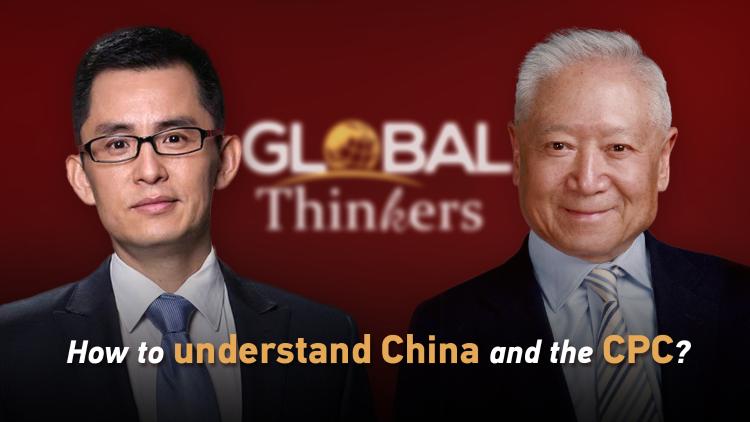- 国家创新与发展战略研究会> 正文
-
对话思想者 | CGTN专访郑必坚:如何读懂中国共产党?
来源:中国科学院国家创新与发展战略研究会发布时间:2021-07-01读懂今天的中国,必须读懂中国共产党。
——习近平
中国共产党100岁了!建党百年之际,世界的目光聚焦中国共产党。国际社会普遍关切,中国共产党领导下的中国要建成一个什么样的国家?中国和世界如何相处?如何读懂中国、读懂中国共产党?
2021年7月1日,CGTN《对话思想者》播出中科院国家创新与发展战略研究会会长郑必坚专访节目,围绕上述问题作了深入解读。

本视频由国家创新与发展战略研究会与CGTN联合策划
以下为精彩观点节选,完整版节目敬请关注CGTN电视台。
一
邹悦:郑会长,非常感谢您接受我们的采访。国际上非常关心中国的动向,一个快速崛起的中国如何和世界相处?有的人认为中国的发展非常迅速,也有的人认为有点咄咄逼人。您怎么看?
Zou Yue: Mr. Zheng, thank you very much for this interview. The international community is keeping a close eye on China’s development and how a fast-rising China will get along with the world. Some people think that China is developing very rapidly, while others think it is a bit aggressive. What do you think?
郑必坚:崛起的中国是不是咄咄逼人?请看事实:中国四十多年快速崛起,一没有搞西方那样的殖民主义;二没有搞美国那样的霸权主义;三没有搞像苏联那样的“社会主义大家庭”;四没有搞北大西洋公约组织和华沙条约组织那样的军事同盟组织;五更没有像一战、二战时一些国家那样通过发动战争来谋取自己的地位。我们走的是和平崛起的发展道路。
Zheng Bijian: Is a rising China aggressive? Let’s look at the facts. China’s rapid rise over the past 40 years has, I think, been marked by several features: Firstly, it has not engaged in colonialism like the West. Secondly, it has not pursued hegemony like the U.S. Thirdly, it has not tried to build a so-called “socialist coalition” like the Soviet Union. Fourthly, it has not been involved in military alliances like NATO and the Warsaw Pact. Fifthly, it has not waged wars to gain a better position like some countries did in World War I and World War II. These are all facts. We’ve engaged in none of these activities. Instead, we have followed the path of peaceful rise and development.
二
邹悦:今年是中国共产党建党一百周年,对未来,您怎么看?
Zou Yue: This year marks the 100th anniversary of the founding of the Communist Party of China. What do you think about the future?
郑必坚:今天中国正迎来一个“新的群众的时代”,中华民族伟大复兴的历史重任也正落到“新的时代的群众”身上。我们通常所说的“80后”“90后”和即将进入社会的“00后”的年轻人,作为“新的群众”,正在成为新时代实现中华民族伟大复兴的生力军。
Zheng Bijian: Today, China is ushering in a new era - an era of the people. The historic mission of the great rejuvenation of the Chinese nation hinges on the people of a new era. So on one hand, you have “a new era of the people”, and on the other hand you have “the people of the new era”. The Millennials and Generation Z, as we commonly call them, are becoming the driving force behind the great rejuvenation of the Chinese nation in this new era.
三
邹悦:说到“读懂中国”,6月21号,习近平总书记给北京大学留学生回信里提到,读懂今天的中国,必须读懂中国共产党。您也多次提出,要读懂中国的未来战略,需要读懂中国共产党。但怎么“读懂”中国共产党?怎么才算“读懂”了中国共产党?
Zou Yue: Speaking of “understanding China”, on June 21 General Secretary Xi Jinping replied in a letter to international students at Peking University, saying that to understand today’s China, you must understand the Communist Party of China. You have repeatedly said that in order to understand China’s future strategy, one needs to understand the Communist Party of China. But how do we understand the CPC? What does it take to understand the Communist Party of China?
郑必坚:中国共产党一百年走过来,能够成为中国人民和中国特色社会主义事业的领导核心,是中国近代以来,即从1840年鸦片战争开始,直到1949年中华人民共和国成立这109年历史曲折发展的结果。
Zheng Bijian: The CPC’s 100-year journey to become the leading core of the Chinese people and of the driving force for socialism with Chinese characteristics is the result of the tortuous development of China’s modern history, that is, from the Opium War in 1840 until the founding of the People’s Republic of China in 1949, a 109-year history.
许多西方人士总是问,中国为什么不实行多党制或两党制,这是他们太不了解中国的历史了。实际上,鸦片战争以后,中国先进分子曾经一股劲向西方寻求真理,搞多党竞争,以为这才是治国大道。到了“民国”初期(1913年),甚至搞过300多个“政党”,还“选举”出了袁世凯这个反动总统。袁后来又复辟帝制,做了83天的短命皇帝,就这样中国的多党制破产了。
Many Westerners always ask why China does not adopt a multi-party system or a two-party system. I think they ask this question because they are too ignorant of China’s history. In fact, after the Opium War, reformists in China were very keen to take the best knowledge and practices from the West, including multi-party competition, thinking that it was the right way to govern the country. At the beginning of the Republic of China in 1913, there were more than 300 “political parties” and the reactionary Yuan Shikai was "elected" president, who later restored the hereditary monarchy with a short-lived reign of 83 days. As a result, China’s multi-party system went completely bankrupt.
所以要讲多党制中国也算是老资格,并且中国的多党制居然还“选”出了“皇帝”!当年中国的先进者,包括共产党最早一代人很多都曾是民主主义者,是真心向往西方民主那一套的。但干下来呢,干不通。而且西方,包括日本帝国主义,还要骑到中国人的头上。这就是毛泽东在《论人民民主专政》中所说:“帝国主义的侵略打破了中国人学西方的迷梦。很奇怪,为什么先生老是侵略学生呢?中国人向西方学得很不少,但是行不通,理想总是不能实现。”正是因为这条西方民主道路的幻灭,才有了共产党。所以老实说,当代世界中东某些地区所谓“茉莉花革命”那种照搬西方的所谓“民选”把戏,中国人一百多年前就领教过了!
It’s not that China has never had a multi-party system. In fact, China adopted such a system long before, which in the end “threw up” an emperor. Many of the people with progressive thinking in China - including the earliest generation of the CPC - were once democrats who genuinely aspired to Western democracy, but later realized it was a dead end. Even worse, it made China vulnerable to the Western imperialists, including Japanese imperialists who sought to invade and conquer China. Chairman Mao Zedong once famously said in his work On People’s Democratic Dictatorship, “Imperialist aggression has shattered the Chinese dream of learning from the West. It is very odd—why are teachers always committing aggression against their pupils? The Chinese have learned a lot from the West, but it does not work, and the ideal can never be realized.” It was precisely this disillusionment of the Western path to democracy that led to the founding of the CPC. Actually, over the years we have seen the so-called “Jasmine Revolution” in the Middle East, and similar efforts to copy Western “democratic elections,” but they have turned out to be shams or Western plots. To be honest, the Chinese experienced such tricks more than 100 years ago.
还要知道,当代中国,走的也是民主之路,但这是另外一条叫做“人民民主”之路。中国共产党是执政党,中国还有八个民主党派是参政党,还有日益发展完善、生动活跃的选举制和协商制这样两种民主制度,构成优于西方“选举民主”的全过程民主,并且民主与法治相结合。这才是中国特色社会主义民主的生动实践。
We also need to be clear about what path we are following in today’s China. Actually, we are also following the path of democracy, but it is a different kind of democracy from its Western counterpart, which we call a “people’s democracy”. The CPC exercises state power, and eight other parties in China participate fully in the administration of state affairs. China also has an increasingly developed and sophisticated electoral and consultative system. These two parallel democratic systems constitute a more complete democracy than Western electoral democracy. We not only have the electoral democracy, but also the consultative democracy after elections, hence giving rise to a whole-process democracy. Moreover, the combination of democracy and the rule of law in China stands out as the best practice of socialist democracy with Chinese characteristics.